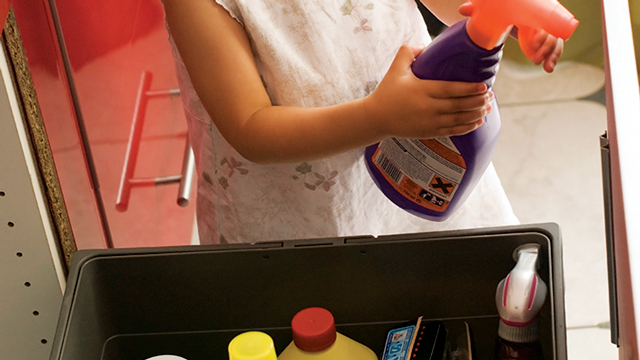Parents can’t wait to mark milestones in their child’s life, such as a first birthday or first steps. However, with these exciting milestones come added dangers, especially related to accidental poisonings. According to national data on poison statistics, children younger than six years comprise nearly half of all poisoning exposures. Preventing accidental poisoning starts with understanding how events occur and taking steps to prevent them.
The most common agents involved in pediatric poisonings include over-the-counter medications, prescription medications, cleaning products, and household items. When children are beginning to crawl, stand, and walk, they are naturally more curious about their environment. This curiosity – combined with the tendency to put objects in the mouth – increases the risk of ingesting a harmful substance.
While working at the Virginia Poison Center, I often spoke to parents who were shocked that their children were able to open a medication bottle or remove the top of a cleaning product. We would often emphasize that containers are child-resistant but never truly child-proof. Some of the most common phone calls we received included ingestion of cleaning supplies, pet food, medications, and personal care products such as nail polish remover. Close supervision is one of the best safeguards in preventing accidental poisonings in children, and it’s particularly important for toddlers (ages twelve to thirty-six months).
Here are some crucial strategies for keeping children safe at home:
1. Store medications in locked cabinets or high up out of reach of children.
2. Never refer to medication as candy, as children may attempt to ingest unknown medication more readily.
3. Immediately put cleaning and household products in safe storage after using them.
4. Be aware of medications brought into the home by guests, especially older individuals who take blood pressure and cardiac medications. Pill boxes are easy to open and easily accessible to kids.
5. Keep chemical products in their original containers and do not store in liquid or food containers that could be mistaken as harmless.
Children’s toys can contain hidden hazards. Although most are regulated and adhere to safety standards, many still pose risks. When choosing safe toys, keep in mind the following:
6. Painted toys should be identified as using lead-free paint.
7. Art supplies should be labeled non-toxic.
8. Battery-operated toys should have battery cases that are secure and not easily opened.
9. Button batteries – found in toys, watches, and hearing aids – are potentially fatal if swallowed and must be considered very dangerous. Call Poison Control immediately if you suspect one has been ingested.
If an accidental poisoning does occur, remain calm and determine if the child is awake, alert, breathing, and responsive. If unresponsive, call 911 immediately for help. Otherwise, contact Poison Control at 1-800-222-1222, and a trained poison specialist will determine the best course of treatment for your child. Be prepared to answer questions such as the type of substance ingested, the weight and age of the child, and the zip code you are calling from. Also, be sure the Poison Control number is programmed into every phone, so you are prepared in case an emergency occurs.
Before your child starts moving and climbing, take steps to ensure your home is free of potential hazards that could result in an accidental poisoning. Be especially vigilant during times when household routines are disrupted, such as moving, vacationing, or when friends are visiting. Remember, poisonings can happen very quickly, and children should never be left unsupervised, even for a short time. Lastly, inform all caregivers how to contact Poison Control and review labels on household items and medications prior to use.




